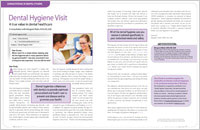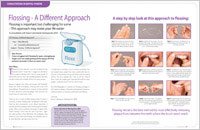In many cases, there isn’t much blood seen when the gums are bleeding, and the problem should go away quickly. However, there are times when you may notice a lot more blood coming from the gums, frequent bleeding, or prolonged bleeding. What issues might be behind these issues? Read on to find out.
Periodontitis is commonly referred to as gum disease. This is one of the main causes of bleeding gums. Periodontitis doesn’t develop at once. It takes a long period of poor oral health to get to the point where an individual has gum disease. The problem starts when plaque isn’t properly removed. When plaque isn’t removed for an extended period, it can cause your gums to separate from your teeth.
The gums will then recede from the teeth, and the spaces between the gums and teeth can trap different kinds of bacteria which can attack the bone and the gums. When the plaque hardens to form tartar, gum disease is said to have set in.
Break down biofilm with PerioRenew
Unhealthy gums can dramatically impact more than just your smile. Learn more about this revolutionary new gel for gum disease.
sponsored ad
Although it’s not common in modern times, there are still some people who experience excessive gum bleeding due to poor nutrition. The lack of vitamins C and K are among the possible causes of excessive bleeding that are diet-related. People with scurvy may also experience heavy gum bleeding.
If you’ve only started experiencing excessive gum bleeding recently and you also started new medication at around the same time, the medication could be the reason. There are certain types of medication that increase the likelihood of experiencing excessive bleeding. Blood thinners, for instance, make your blood less likely to clot. Therefore, even a tiny cut may bleed excessively.
Leukemia is a cancer of the blood, and one of its many side effects is that it can lower the platelet count in your blood. Platelets help to stop bleeding, and if your blood has a low platelet count, excessive bleeding is possible.
Hemophilia is a condition that prevents your blood from clotting properly. This can cause heavy bleeding from the slightest cut or injection. Let your dentist know if you have this condition.
While some of these conditions may cause you concern, there are many reasons for gum bleeding that are perfectly easy to fix. The best place to start is by scheduling an appointment with your dentist so that they can check out the reason for your issue.
 Oral Hygiene – Dental Health for Life
Oral Hygiene – Dental Health for Life
The best tools for maintaining your oral health and minimizing dental problems are a quality toothbrush, toothpaste, a roll of dental floss, approved mouthwash and good diet. Unfortunately, myths and folklore abound on how and what to use to best effect. This article cuts through the confusion with a winning game plan for oral health… Read Article
 Dental Hygiene Visit
Dental Hygiene Visit
Each dental hygiene visit begins by reviewing your health history to identify issues that may necessitate special precautions during dental hygiene care to ensure your safety and to prevent medical emergencies… Read Article
 Flossing – A Different Approach
Flossing – A Different Approach
Flossing is important but challenging for some – this approach may make your life easier! Research suggests that while most people will habitually brush their teeth, developing a flossing habit is still a bit more difficult. Flossing however, remains the best method for most effectively removing plaque from between the teeth where the brush won’t reach… Read Article

